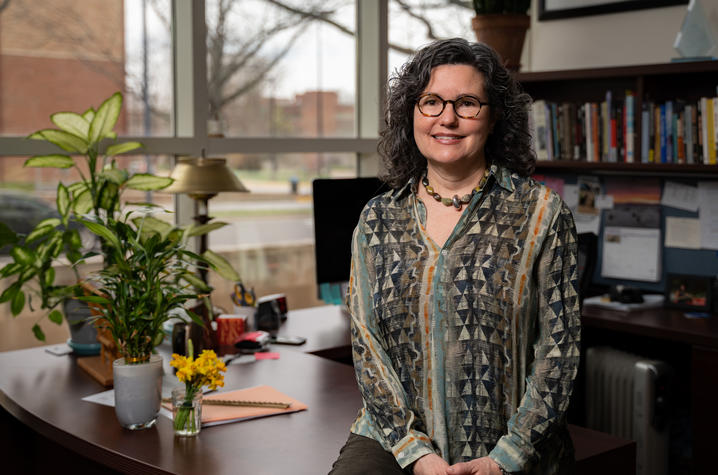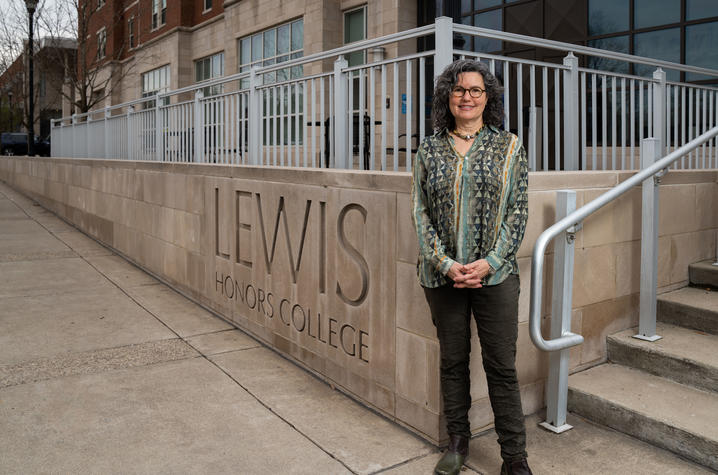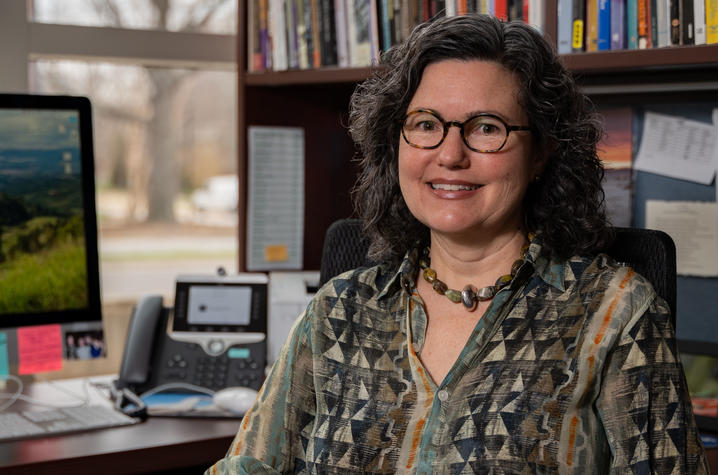Women Making History: UK researcher works to preserve collective memory of WWI
LEXINGTON, Ky. (March 29, 2023) — Throughout March, the University of Kentucky is spotlighting Women Making History during Women’s History Month. These women are leading their fields of research and impacting the lives of Kentuckians.
Their work addresses key issues impacting the Commonwealth, like cancer, Alzheimer’s disease and diabetes. They also offer new perspectives on history by finding ways to preserve our collective memory and better understand it.
One University of Kentucky researcher is studying what some scholars call a “Twilight Zone of History,” a moment between what’s passed down through family memory and what’s accessible through historical texts.
Pearl James, Ph.D., is an associate dean in the Lewis Honors College and an associate professor of English in the College of Arts and Sciences. Her research focus is on war studies, war literature and war film with an emphasis on World War I.
“WWI is a well-documented, well-studied, huge cultural event. One might ask, ‘What else can be said about it?’ It turns out, if you bring an interdisciplinary perspective to bear, asking questions about gender and identity, feelings, artistic productions and the homefront, there are a lot of interesting discoveries still to be made and understood,” said James.
World War I, also called the Great War, brought unparalleled devastation and destruction. It was fought between the Allies and Central Powers from 1914 to 1918. Roughly 8.5 million combatants were killed and another 21 million wounded.
The U.S. made a late entry into the conflict, joining the Allies in 1917 and drafting 4 million men into service. By the summer of 1918, about 2 million American soldiers were overseas in France. In total, the U.S. would see roughly 320,000 casualties.
In James’ book, “The New Death: American Modernism and World War I,” she writes about authors like F. Scott Fitzgerald, Ernest Hemingway, William Faulkner and Willa Cather and their response to the unprecedented violence seen in WWI.
“I try to situate literary texts within their wider cultural context of the 1910s and ’20s. I argue that they really need to be read and understood as not taking place in a vacuum, but as urging their audiences to think and feel differently about certain issues that were pressing at the time, like families losing loved ones, or getting remains shipped from Europe or never learning their loved one’s fate,” said James.
The researcher also pays particular interest to war films. James analyzes how they’re produced to look and feel authentic, how that’s changed over time and why filmmakers are focused on such accurate portrayals.
“There's a generation of women scholars — and I hope I'm one of them — that are expanding the notion of what war studies look like.”
James found inspiration on the topic during a trip to the Champagne region of France while a graduate student. She saw the landscape still scarred from the war decades earlier and noted references made in literary texts she was reading.
James also discovered a tie to WWI through her family. Her great-grandfather was a doctor in the war and channeled his experience into learning about orthopaedics. At the time, the area of medicine was new and critical after the massive joint casualties during the war.
“My great-grandfather went back to Vienna 10 years after the war to do, basically, a residency in orthopaedics. He learned about prosthetics and brought that knowledge back to the U.S. It was a really important part of his career, and I had never connected that to WWI.
“It affirmed my sense that this was a huge cultural moment. The war’s effects were ubiquitous. But for some reason, we haven’t been talking about this. WWI seems a little more distant than the memories of World War II,” said James.
In addition to her scholarly work, James shares what she’s learned with general audiences in opportunities like keynote lectures and talks at the National WWI Museum and Memorial.
“I enjoy making scholarship accessible through teaching the wider public how to look at a visual text or a literary text with the analytical skills we as scholars use every day and take for granted,” said James. “I think we live in a culture where everyone reads everything incredibly quickly. I like opportunities to slow people down with texts and encourage readers to ask questions.”
James also mentors graduate students and is currently advising several on their dissertations. One of those students, Army Lt. Col. Deborah Daley, teaches at United States Military Academy West Point and is writing about female soldiers.
“She brings a knowledge of context that I don’t have, but I can still guide her and push her with questions that are going to help her articulate her argument more clearly. It’s been a real honor and privilege to work with her.”
Other women have been a source of support for James in her career. At UK, the author found encouragement in the College of Arts and Sciences from other notable scholars: Karen Petrone, Ph.D., professor and inaugural director of the Cooperative for the Humanities and Social Sciences; Ana Rueda, Ph.D., the William T. Bryan Endowed Chair in Spanish and a College of Arts and Sciences distinguished professor; and Ellen Rosenman, Ph.D., emeritus professor in the Department of English.
“I really respect all of them tremendously,” said James. “When they have been interested in my work, that has reaffirmed my sense that it’s valuable and it’s worth pursuing and that it has an audience.”
The key for James, like many of the other women highlighted this month, is to find the right balance in life. It’s her piece of advice for the next wave of women heading into research.
“Finding the right balance for you between your various commitments — family, personal, wellness — along with the demands of being competitive in research is very important. Research can be consuming, and I think figuring out how to make your peace with that earlier rather than later is helpful. It’s also okay to give yourself permission to be more and less intense about things at different moments in life.”
As the state’s flagship, land-grant institution, the University of Kentucky exists to advance the Commonwealth. We do that by preparing the next generation of leaders — placing students at the heart of everything we do — and transforming the lives of Kentuckians through education, research and creative work, service and health care. We pride ourselves on being a catalyst for breakthroughs and a force for healing, a place where ingenuity unfolds. It's all made possible by our people — visionaries, disruptors and pioneers — who make up 200 academic programs, a $476.5 million research and development enterprise and a world-class medical center, all on one campus.







